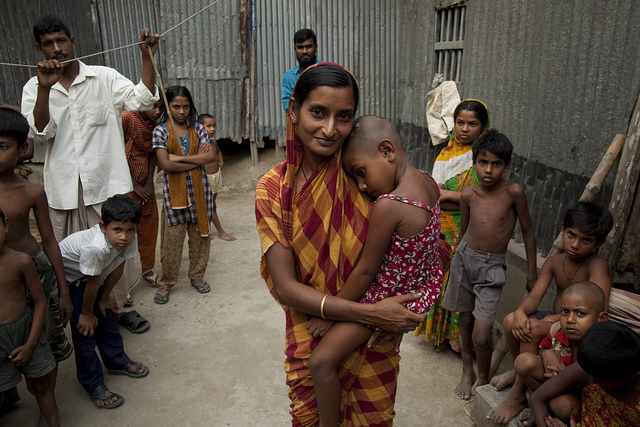Bangladesh has been making impressive strides in reducing hunger and undernutrition; nonetheless, nutrition remains a challenge for many households. At the Compact 2025 roundtable discussion on May 5, 2016 in Dhaka, over 100 stakeholders from various sectors had the opportunity to discuss how to accelerate progress by leveraging multiple sectors such as agriculture, gender, social protection, water, and sanitation. The importance of a multi-sectoral approach to accelerating progress in eradicating hunger and undernutrition was recently highlighted by a pilot initiative in Bangladesh, the Transfer Modality Research Initiative (TMRI), which leveraged social protection programs to improve nutrition.
In 2010, the government of Bangladesh partnered with IFPRI and the United States Agency for International Development (USAID) to establish the Bangladesh Policy Research and Strategy Support Program (PRSSP) to generate innovative research to fill knowledge gaps and inform food and agricultural policies. PRSSP looked into how social protection can be used to improve nutrition. In 2011, IFPRI, through PRSSP and with support from the CGIAR Research Program Policies, Institutions, and Markets (PIM), partnered with the World Food Programme in Bangladesh to pilot the TMRI. The initiative provided 4,000 ultra-poor women and their 21,600 family members substantial benefits from 2012 to 2014. Using a randomized control trial approach, IFPRI evaluated the impact of four different types of transfers—cash, food, a combination of cash and food, or a combination of either cash or food with complementary nutrition behavior change communication (or nutrition education)—on the beneficiaries’ income, food security, and child nutrition.
IFPRI’s study produced robust evidence that providing nutrition education along with cash transfers improved the recipients’ nutrition, health, and overall well-being. IFPRI’s assessment also showed that the initiative accelerated the reduction of child stunting in recipients by more than 7 percent—a huge achievement that is three times the national average over the same period.
Enthused by the impact of cash and nutrition education on child stunting, the government of Bangladesh formed an inter-ministerial Technical Committee with representatives from nine ministries, IFPRI, and WFP to devise a plan to scale-up the pilot initiative. More importantly, IFPRI’s research helped shift the mindset of the government regarding the type of transfers it will implement under the National Social Protection Strategy (NSPS). During the finalization of the NSPS in 2015, the government was considering strictly using food or cash transfers for its social protection programs; however, IFPRI’s study contributed to the government’s decision to use a combination of cash transfers and behavior-changing education to significantly improve the welfare of the poor. In addition, IFPRI’s findings attracted extensive media attention, including from the Daily Star, the largest daily English newspaper in Bangladesh, which helped promulgate the importance of integrating nutrition education into social protection programs.
Download a printable PDF of this post here. For more Outcome Stories, see the Outcome Stories website.







